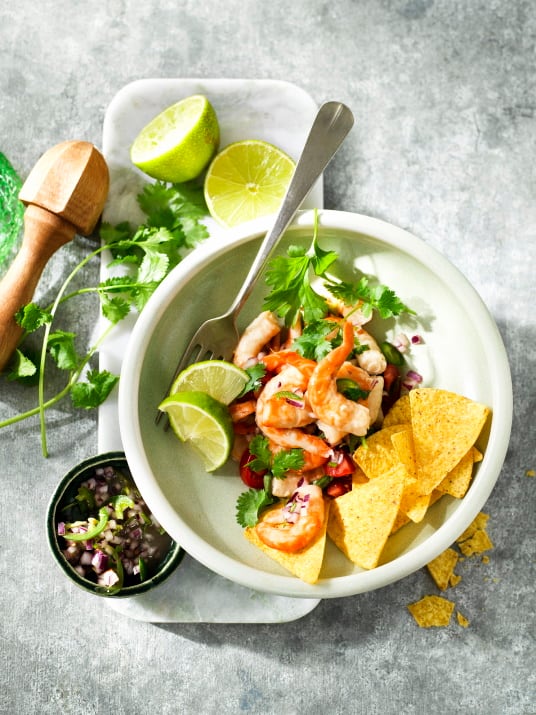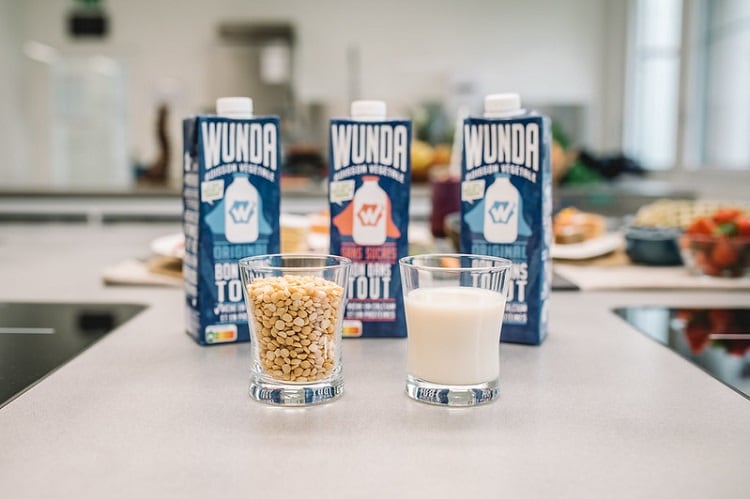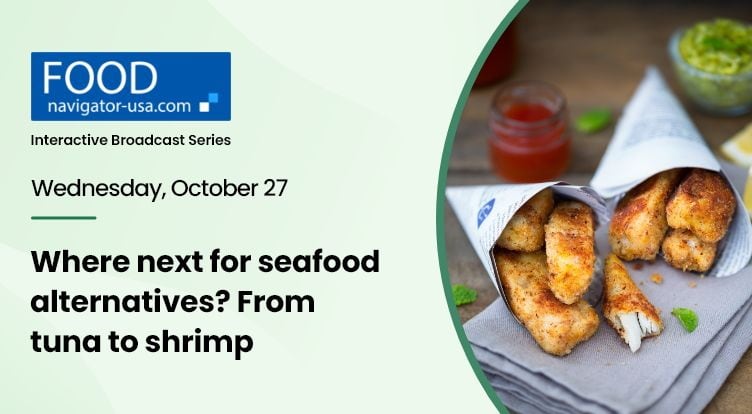Nestlé is expanding its plant-based portfolio with the test launch of two new products in Europe – plant-based alternatives to egg and shrimp.
Made from soy protein, canola oil, omega 3 fatty acids, carrot juice and 'natural flavourings', the plant-based egg replacer will be launched under the Garden Gourmet vEGGie brand. The product is vegan and achieves a Nutri-Score of A in Europe.
The liquid egg alternative can be cooked in a variety of ways, from scrambling to baking. Compared to other egg alternatives on the market, Nestlé CTO Stefan Palzer believes vEGGie stacks up favourably. “We think we are matching them with the final quality. What makes us different is [our use of just] five ingredients. We look at what some start-ups are using, it is a very long ingredient list and that's not what we want to have... and we are matching the protein content of animal-based eggs,” he told journalists in London yesterday.
The Swiss food company’s latest addition to its alternative seafood line-up (it already sells a tuna alternative, Vuna, in Switzerland, Germany, Italy and the Netherlands) also delivers a clean label. Garden Gourmet Vrimp is a plant-based alternative shrimp made from pea protein and konjac root. It takes its colour from paprika and carrot and the distinctive seafood taste is achieved through the addition of nori algae. It’s Nutri-Score is B.
Stepping-up plant-based innovation
Nestlé is taking a ‘test and learn’ route to the rollout, launching in select markets including Switzerland and Germany to gain insight before extending more widely. This is an approach the company has developed to deliver greater agility in R&D and get products to market faster.
“The aim is to go in six months from idea to shelf,” Palzer told us. vEGGie and Vrimp were both developed using proprietary technologies in under a year, he noted.

Speed and agility are necessary in the highly competitive plant-based space, where the Swiss tanker is competing against smaller brands and speedboat start-ups. Innovation rates are high. According to Mintel’s GNPD, a database tracking product launches, 12% of new products featured a vegan claim in Europe and North America last year compared to 7% five years before.
Nestlé has a number of things going for it, Palzer suggested, including expertise in sourcing (‘the better the raw material you start with, the better the end product’, according to the CTO); deep knowhow to draw on regarding formulation and the functional properties of proteins; alongside nutritional and culinary expertise. Nestlé is also placing pretty significant manpower behind its plant-based push, with ~10% of its around 3000-strong R&D team working in the space.
The pace of change also shapes Nestlé's approach to production. "You need to have highly flexible lines because the market is developing so quickly," Palzer revealed.
All this is necessary because, in plant-based, the consumer is moving extremely fast. To keep pace, Nestlé is leveraging social listening tools to gain direct consumer insight. It has also established accelerators to work with start-ups and student teams alongside an ‘internal shark tank’ to support innovators within its own operation.
Overhauling its approach to plant-based R&D has delivered positive results. “Last year we had more launches than ever… the pandemic is not slowing us down,” Palzer insisted.
Innovation that’s good for people, planet and profits
The business possibilities presented by plant-based are sizeable, chief executive Mark Schneider observed.
The plant-based food market was valued at $29.4bn in 2020, according to Bloomberg Intelligence, with growth expected to rocket to $161.9bn over the next ten years.
Within Nestlé, pure-play plant-based brands such as Garden Gourmet or Wunda pea milk generate revenue of CHF200m. But the size of the opportunity is far greater when you factor in plant-based options sold under Nestlé’s mainstream brands. The use of plant-based ingredients on pizzas, in Nestlé’s dairy brands, or products like the vegan KitKat lift sales to CHF1bn. This is still a small proportion of Nestlé’s revenue, which stands at more than CHF84bn, but with 'strong' double-digit gains plant-based is growing ahead of the company mid-single-digit average, Schneider explained. “This is catching up quite fast."
Schneider conceded that Nestlé was somewhat late to the game in some plant-based categories. The company launched Wunda pea milk earlier this year, for instance, but the alternative milk sector has been growing share of shelf for considerably longer. Similarly, Nestlé wasn’t the first-to-market with meat analogues that claim to deliver a comparable experience to the animal-based counterpart.
“We were late [with Wunda] but we are out there now, and we believe we are there for more mainstream adoption…. We didn’t invent the plant-based burger or chicken but I believe we lead everyone around the world when it comes to taste, mouthfeel and nutrition.”

For Nestlé, appealing to the mainstream is an important pillar of its plant-based strategy. “We are catering with these products to mainstream consumers. This is where the major opportunities for public health and the environment are,” the chief executive noted.
Schneider sees these two issues as the big drivers of plant-based demand. On health, Nestlé management said the company is developing products with a comparable level of protein to their animal-based counterparts, but that are also lower in fat, lactose free and high in fibre.
Plant-based products also offer a considerably lower carbon footprint, Schneider continued, placing R&D efforts within the context of Nestlé’s regenerative agriculture ambitions. “For a hamburger patty of equal size and weight… a 70-80% reduction in greenhouse gasses is available,” he claimed.
The potential to scale this impact is particularly important, according to Andrew Morlet, CEO of NGO the Ellen MacArthur Foundation. Speaking at the same event, Morlet noted that while the current focus of the climate agenda is on the energy sector, 45% of the problem lies in ‘the way we make and use things, including food’.
“The innovation and upstream redesign of the food system is absolutely essential,” Morlet argued. “We have to redesign food, so it is more plant-based, more regenerative, the sourcing of inputs is more diverse.
“If Nestlé pursues this journey from plant-based to regenerative by design it can scale really quickly… This ability to innovate, bring to shelf quickly and then scale globally…. We’re delighted to see this direction of travel.”
What’s next for plant-based?
If the aim is to scale healthier, more environmentally friendly plant-based options innovation represents an important unlock, Nestlé’s Schneider explained. And there is a long runway of opportunity. “There will be the opportunity to launch alternatives to every animal protein and give consumers the choice,” he predicted.
Within analogues, the company’s chief technology officer stressed the importance of mimicking a taste, texture and mouthfeel that consumers are already familiar with. “You need to be as close to the animal protein or you won’t get consumers to switch,” Palzer suggested.
One thing that plant-based analogues can really deliver on is the social aspect of food, Palzer noted. With family mealtimes having to cater to different dietary requirements plant-based analogues offer what he termed a ‘consensus dish’. “Food is about sharing dishes and the products we bring to market are suitable for the entire family.”
So, what’s next on Nestlé’s plant-based menu?
As well as continuing the extension of plant-based options in its mainstream brands - think more coffee mixes, creamers and ice creams - Palzer is upbeat on the possibilities on offer with the development of plant-based whole cuts. Seafood and fish provide ‘ample opportunities’, he added.
"The whole seafood and fish space offers ample opportunities. To get the flaky texture of fish in a plant-based form isn't easy."
Interested in seafood alternatives?
Checkout part three of FoodNavigator-USA's FREE 'Disrupting the Meat and Dairy Case' series on October 27:
Where next for seafood alternatives? From tuna to shrimp
Who are the key players, what's in the ingredients toolbox and how does the nutrition of plant-based products stack up? Join FoodNavigator-USA editor Elaine Watson to explore the relatively untapped plant-based seafood category in the US in a FREE webinar Oct 27 (10am PT/1pm ET) featuring The Good Food Institute, Good Catch, Ocean Hugger, New Wave Foods, and Aqua Cultured Foods.
We’ll explore:
- Ingredients: The evolving toolkit for seafood alternatives
- Formulation trends: Improving the taste, color, and texture of seafood alternatives
- Nutrition: Are they good for you, and are consumer expectations changing?
- The addressable market for seafood alternatives and go-to-market strategies
- The primary purchase drivers for meat alternatives
- What are consumers looking for and how do we engage them?
- Exploring the white space in the market



